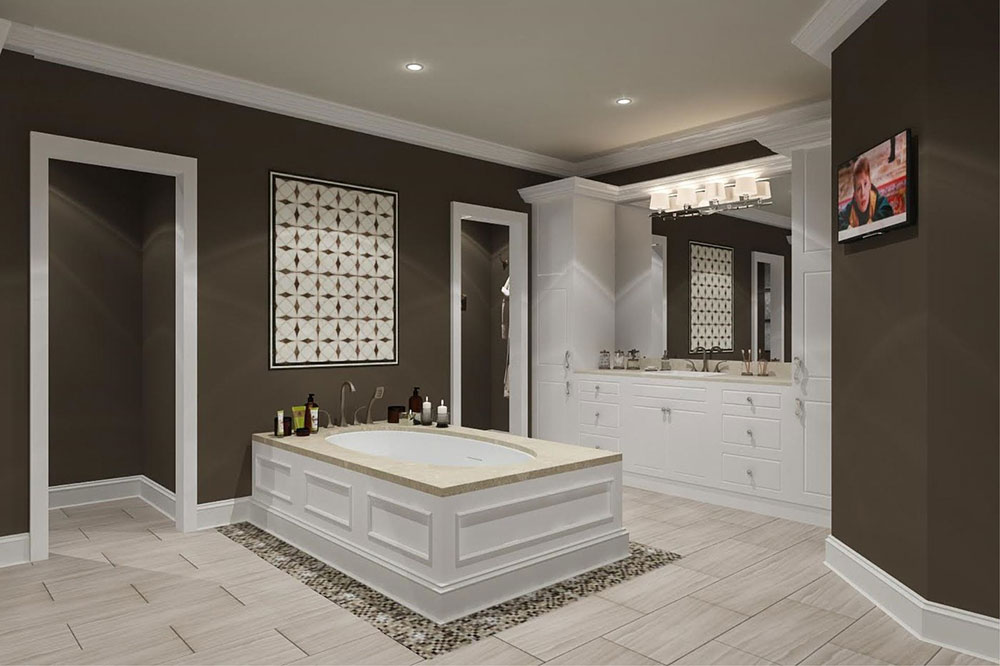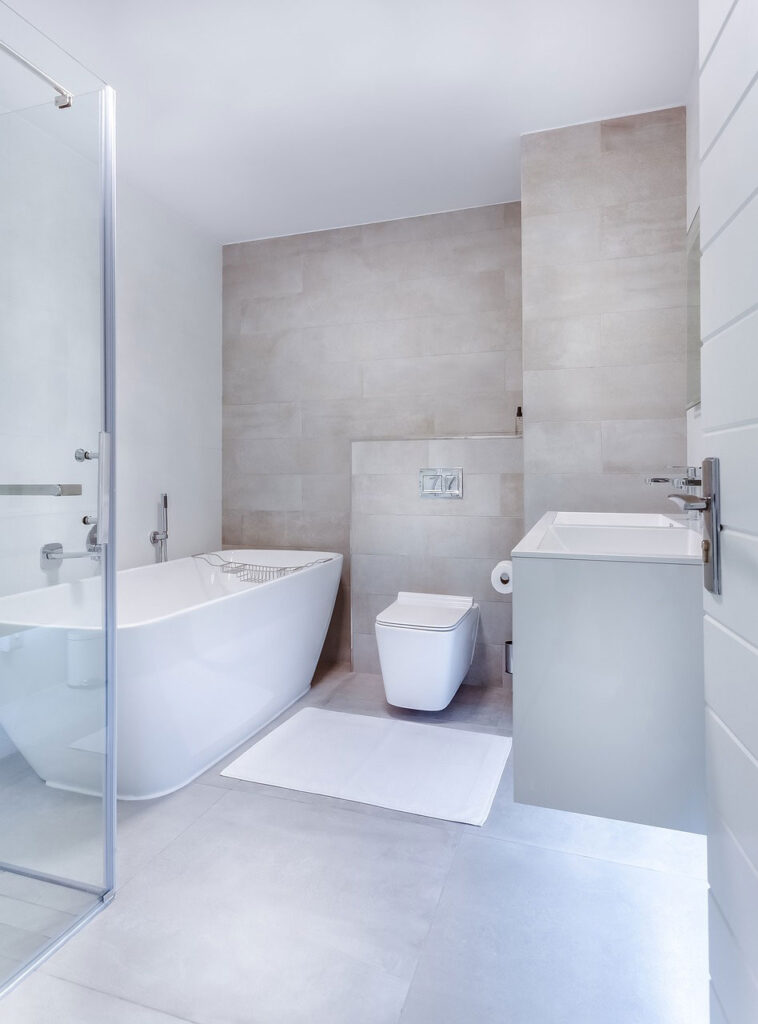When searching for a bathroom fitter, there are several important criteria to consider.
Finding the ideal bathroom fitter can be a daunting task. To make it simpler, here is our comprehensive guide on what qualities to look for when selecting a bathroom fitter:
- Experience: Look for a bathroom fitter who has several years of experience in the industry. The more knowledgeable they are, the better equipped they will be to tackle any obstacles that may arise during installation. Experience does matter.
- Reviews and recommendations: Read online reviews and ask friends and family for recommendations about the fitter’s quality of work and professionalism. This will give you an indication of their responsiveness to requests for service as well.
- Portfolio: Review the fitter’s portfolio to view examples of their previous work, providing you with a sense of their style and level of proficiency. This will give you valuable insight into their capabilities.
- Licenses and Certifications: Ensure your fitter holds all necessary licenses and certifications required by law, to avoid any legal complications in the future. This will help you prevent any legal disputes from arising. In the UK, there are no specific qualifications or licenses required to work as a bathroom fitter. However, most professional bathroom fitters will have a combination of relevant training, experience, and certifications that demonstrate their expertise and qualifications for the job.
- Price: Get quotes from several fitters and compare them. Make sure the quotes include all necessary costs such as materials, labor, and any additional charges that may apply.
- Communication: Make sure the fitter you select communicates clearly and effectively with you. They should pay close attention to your requirements, providing regular updates throughout the installation process.
- Guarantees: Look for a fitter who provides warranties on their work. Doing so will give you assurance that any issues will be taken care of quickly and correctly. 7. Efficiency Guarantees: Don’t settle for anything less than perfection from your fitter; ask them what guarantees they offer on their work before hiring them!
- Timing: Be sure to ask the fitter how long the installation will take and if they can work around your schedule. Ideally, you want someone who can complete the job within a reasonable amount of time without interfering with daily activities.
- Insurance: Make sure the fitter has liability insurance in case of any accidents or damages during installation.
- Compatibility: Make sure the fitter you select is compatible with both your personality and style. You want someone who will make working together a pleasure, as well as someone who shares your enthusiasm for creating the ideal bathroom.
By following these tips, you can find the ideal bathroom fitter who will deliver a stunning and functional space that meets all of your requirements.
What is the difference between a bathroom fitter and plumber?
A bathroom fitter is an expert who specializes in installation, renovation, and repair of bathrooms. They are accountable for creating the design of the room as well as installing fixtures like toilets, sinks, showers, baths. Bathroom fitters also take care of tiling, flooring, and other finishing touches so your bathroom looks fully functional and aesthetically pleasing.
On the other hand, a plumber is an expert tradesperson who specializes in installing, maintaining and repairing plumbing systems. This includes pipes, fixtures and fittings used for water distribution and waste removal. Plumbers work on various projects such as residential or commercial buildings and may specialize in certain fields like gas fitting, heating or drainage systems.
Although some similarities exist between bathroom fitters and plumbers, their primary area of specialization lies in bathroom installations and designs. Bathroom fitters specialize in this particular task while plumbers possess a more general set of skills which include the installation and upkeep of plumbing systems throughout a building.
What Tradesman Do I Need for Bathroom Installation?
In order to install a bathroom, you will likely require the services of several tradespeople who possess the necessary skillset. The exact number and types of tradespeople needed depends on your project specifications; however, generally speaking you’ll require:
- Bathroom Fitter: A bathroom fitter specializes in the installation and renovation of bathrooms. They’ll collaborate closely with you to design and construct a bathroom that meets both your requirements and budget.
- Plumber: Your plumber will be responsible for installing and connecting all pipes, fixtures, and fittings in your bathroom – such as your sink, shower, bathtub, and toilet.
- Electrician: Your electrician will be responsible for installing all electrical components in your bathroom, such as lighting fixtures, outlets and switches. They guarantee that all work adheres to safety codes and requirements.
- Tiler: Your tiler will lay tiles on both the floor and walls of your bathroom, giving it a professional and attractive finish.
- Carpenter: If you require custom cabinetry or shelving installed in your bathroom, hiring a carpenter to construct and install these items may be necessary.
- Decorator: If you want to paint or wallpaper your bathroom, a decorator may be needed to finish the task.
It’s essential that any tradesperson you hire is licensed and insured. When seeking out a tradesperson, it may be beneficial to get several quotes and check references in order to guarantee you’re getting quality workmanship at an acceptable cost.
What to Ask when Receiving a Bathroom Quote?
When getting a bathroom quote, it’s essential to ask the right questions so you have full transparency on both costs and scope of the project. Here are some key inquiries you should ask when receiving your estimate:
- What is included in the quote? Request a detailed breakdown of costs, such as materials and labor. Doing this will enable you to understand what is included and prevent any unpleasant surprises later on.
- Are There Any Additional Costs I Should Be Aware Of? Make sure you ask if there are any potential hidden expenses during the project, such as unexpected repairs or delays. Doing this helps you plan for any unanticipated fees.
- How long will it take to finish? Obtain an estimated timeline for the project, including start and end dates. Doing this allows you to plan ahead and guarantee that it is finished within a reasonable amount of time.
- What are the payment terms? Be sure to inquire about the payment schedule and when payments must be made. It’s essential that these conditions are fair and transparent for both you and the merchant.
- What warranties or guarantees do you offer? Be sure to inquire about any warranties or guarantees the contractor provides for their work, both materials and labour. Doing this can give you peace of mind and protect you in case there are any defects or issues with the work.
- Are You Licensed and Insured? Be sure to inquire about a contractor’s licenses and insurance policies. It is essential that they possess both proper authority to perform the work as well as sufficient coverage in case any accidents or damages occur.
- Can you provide references or examples of past work? Getting references or examples from a contractor’s past work can give you insight into their quality and help you make an informed decision.
By asking these questions when getting a bathroom quote, you can ensure you have an accurate understanding of the cost, scope and timeline for the project as well as the contractor’s credentials and experience. Doing this will enable you to select someone who can deliver high-quality bathroom renovation services within budget while meeting all of your needs.
Do You Tie Before Fitting Bathroom Suite?
The order in which you tile and install your bathroom suite depends on the specifics of your project as well as personal preference. Generally, it’s recommended to do both first.
The primary reason for this is that tiling is a messy job that creates dust and debris, making it much easier to tidy up these materials before installing your bathroom suite. Furthermore, if you try to tile before fitting fixtures, gaps or uneven tile lines may develop around them – leading to unsightly gaps or uneven tile lines.
By tiling first, you can ensure the tiles are correctly installed and cut to fit around bathroom fixtures precisely. Doing so will give your bathroom a polished, finished appearance.
Once the tiling is complete, the bathroom suite can be installed atop of the tiles. This ensures that fixtures are securely and aligned with their respective tiles, allowing any necessary adjustments to be made before final finishing touches are applied.
Ultimately, the order in which you tile and install your bathroom suite depends on both individual project needs and personal preferences. Generally, it is recommended to start by tiling first then fitting the suite.
What is the average cost to install a bathroom in the UK?
Installing a bathroom in the UK can vary considerably based on factors such as room size, project complexity, materials used and location of property. On average though, according to various sources the average cost per bathroom installation ranges between £4,500 and £15,500.
On average, this cost usually includes installing a bathroom suite (including toilet, sink, bathtub or shower and fixtures), as well as new plumbing and electrical systems, tiling, flooring and painting or wallpapering.
Of course, the final cost will depend on your project specifications. For instance, if you opt for high-end materials, install custom cabinetry or shelving, or make significant structural modifications to a room, expect costs to be higher than average. Furthermore, living in high-cost areas like London or the southeast may mean costs are higher than national average as well.
When planning a bathroom installation project, it is essential to get multiple quotes from reliable contractors in order to guarantee you get an equitable price for the work. Be sure to provide detailed information about your project requirements–including any custom features or materials–so that the quotes received are precise and comparable.
Shirley Mist has been involved in fashion and design for many years. She has also written extensively for many online publications. She currently writes for The Tribune World and is a valued member of our team.

